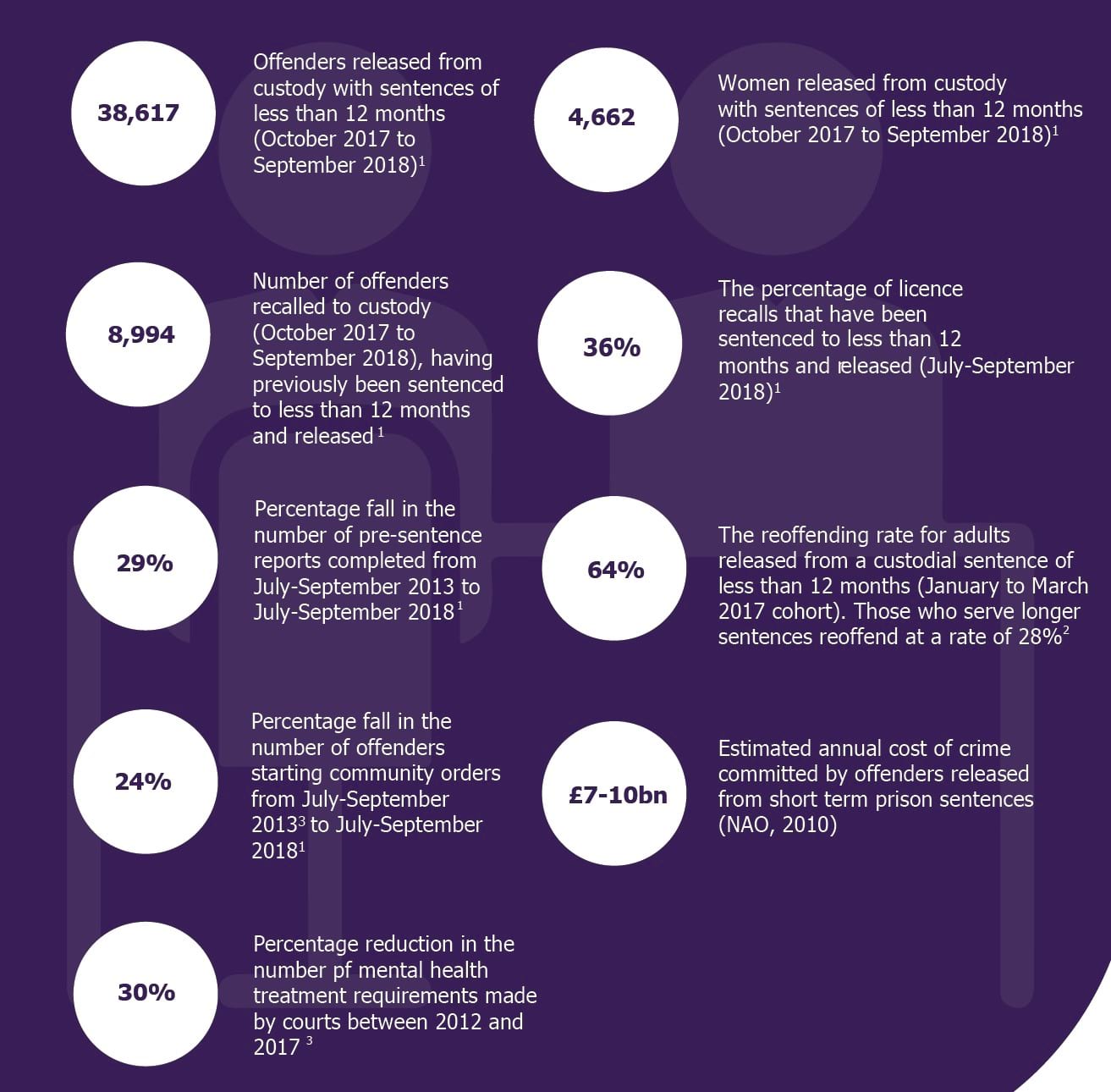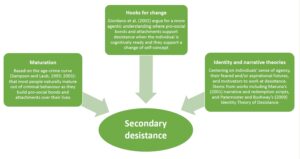Today’s thematic inspection of Community Rehabilitation Companies’ work with short-term prisoners subject to post-release supervision makes for predictably grim reading.
Last year, more than 38,000 people were released from prison after serving sentences of less than 12 months. Many of these individuals are prolific perpetrators of crime, with chaotic lifestyles and complex needs.
The government’s Transforming Rehabilitation programme extended the probation period for short-term prisoners. Now, all offenders who are sentenced to more than one day and less than two years in prison are supervised for 12 months. Private probation providers – known as Community Rehabilitation Companies (CRCs) – are responsible for supervising around three-quarters of short-term prisoners after release.
Chief Inspector of Probation Dame Glenys Stacey said:
The government introduced this change with the aim of reducing reoffending. In the cases we inspected, we found no tangible reduction in reoffending. National reoffending statistics show no material change in reoffending either; moreover, almost one in four are recalled to prison.
This ‘one size fits all’ approach is unhelpful. Many individuals who receive short sentences need intensive support; conversely, just under a quarter of inspected cases were lower-risk so supervision periods could have potentially been shortened or suspended. In my opinion, we need a more tailored approach to probation supervision for short-term prisoners and to direct resources to where they are most needed.
Nearly two-thirds (64 per cent) of short-term prisoners go on to reoffend, committing crime worth an estimated £7-10bn per year. By comparison, the reoffending rate is 28 per cent for those who have served longer sentences. Inspectors found inconsistencies in the way prisoners are prepared for release. Of the CRCs inspected so far this year, the Inspectorate has rated ‘Through the Gate’ services as ‘Good’ in four CRCs, ‘Requires improvement’ in seven CRCs, and ‘Inadequate’ in three CRCs. Inspectors were “shocked” to find pre-sentence reports had been completed in less than a quarter of inspected cases and prisoners’ needs had not been identified prior to release in almost a third of inspected cases.
Dame Glenys said:
The lack of pre-sentence reports is a national problem. It is plainly unacceptable for magistrates and judges to sentence a person to custody without the benefit of essential information and advice on why they offended, their current circumstances and any alternative sentence options. Prisons and probation services are also left without vital information to manage the individual’s case after they are sentenced.
It is regrettable that the work done by prison-based resettlement teams is not more effective. Our inspection found almost one in three people are released from prison with no fixed abode. Individuals can only apply for Universal Credit after release; the application process is challenging for those without a permanent address, documentation and the IT skills to apply for benefits online. The lack of accommodation and money make the first days following release particularly difficult. Those leaving custody after a short sentence are very likely to need early help and are likely to return to prison promptly without it.
Inspectors found the quality of post-release supervision for short-term prisoners was variable. In too many cases, CRCs focussed on staying in contact with individuals, rather than supporting and challenging them to address their offending behaviour. Inspectors found probation staff adequately assessed why individuals offended, what could stop them from offending again, and their personal circumstances. However, probation staff should have paid greater attention to public safety and the individual’s welfare and wellbeing in just under a third of inspected cases.
The inspection found CRCs supervise short-term prisoners in much the same way as other types of offenders. There is no contractual obligation to take a different tack, but inspectors concluded this approach “hardly scratches the surface” with this group. Inspectors found probation staff did not keep pace with the rapid changes that can affect individuals leaving prison. Issues, such as moving in and out of temporary accommodation or stopping treatment for drug addictions, can heighten the risk of reoffending and should be reflected in supervision plans.

Conclusions
Of course the failure of the new probation system with this group of short-term offenders is well-known and was one of the primary reasons for last week’s announcement that the system will be modified again.
However, as you will see from my blog post yesterday examining the MoJ’s response to its probation consultation, the future of resettlement work and of post-sentence supervision itself is far from clear.
The inspectors’ report concludes with 11 recommendations to improve the quality of probation supervision of short-term prisoners as they resettle in the community.
Dame Glenys said:
Many of these individuals do not have supportive networks of family and friends, so the relationship between the probation professional and individual can be pivotal. We recommend CRCs deliver tailored probation supervision and ensure the continuity of relationships as far as possible.
We want to see greater leadership and grip on national issues: a strategy to tackle the lack of accommodation, continued efforts to address barriers to claiming Universal Credit, and better access to mental health and substance misuse services. If a prison sentence is being considered, we recommend comprehensive pre-sentence reports are prepared.
At present, there is a lack of reliable data about short-term prisoners. We recommend this is addressed so we can gain a better understanding of this group and how they fare when they return to the community.
The government has signalled its intention to move away from short sentences, but this is unlikely to be effective without other changes. All under probation supervision should be supervised to a good standard, of course, but intensive and holistic rehabilitative supervision will be required for this group to meet the government’s aims. In my view, a system-wide approach as well as much more purposeful probation supervision is needed. Without it, individuals are locked in an expensive merry-go-round of criminal justice processes and the public are left at undue risk.
Thanks to Andy Aitchison for kind permission to use the images in this post. You can see Andy’s work here.








